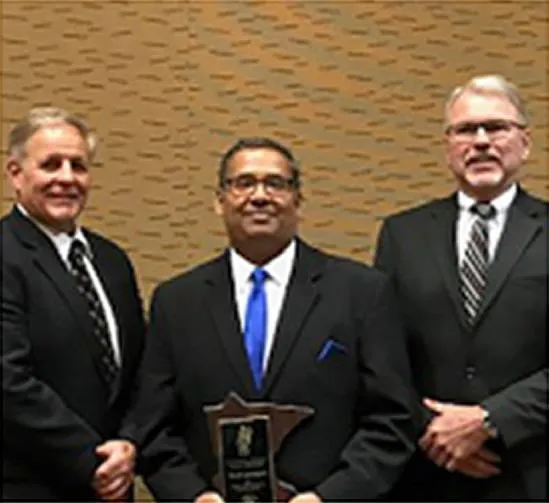Hennepin County Parole Officer Wins Corrections Award

Congratulations to Mitch Gundgovi of AFSCME Local 552! Gundgovi was honored with the Minnesota Corrections Association’s Professional Achievement Award for 2018. He was nominated by DOC Deputy Commissioner Ron Solheid for his outstanding work helping former inmates transition into supervised release. Mitch’s supervisors and coworkers praised his commitment to serving his clients with dignity and respect so they can successfully and meaningfully re-enter our communities.
“Mitch values public service. He supervises some of Minnesota’s toughest parolees,” says AFSCME Council 5 President Pat Guernsey, who’s worked with Gundgovi for more than two decades. “Mitch’s commitment to helping parolees re-enter our communities safely and responsibly, along with his dedication to supporting his colleagues, make him an asset to our team and to our union. I’m proud to serve alongside him as a parole officer, and to call him my AFSCME brother,” Guernsey adds.
Mitch says being part of AFSCME gives him the support and confidence to be able to serve the public with such dedication and grace. Intensive parole may be done between individual parolees and their parole officers, but it requires guidance and support from colleagues. "I'm one of 17 and we're all out here trying to help create change," Gundgovi relates, speaking of his union team members. The workers depend on each other to succeed.
“Working in ISR, I’ve got people supporting me, fellow colleagues, AFSCME members, it’s just a positive environment that I feel every day when I go to work,” he says. “I basically view everybody I work with in the agency like a brother and sister. I learn from everybody. They help me on a day-to-day basis. I don’t do it alone. I appreciate knowing I have my fellow probation and parole officers with me. We’re all in this together, helping people with their lives.”
The MCA award is especially meaningful because of the impact Gundgovi’s work has on the clients he serves and the communities where we all live.
“This type of work is not easy, it’s not for everyone. It’s really difficult to plug into other people’s dysfunction, but the reward at the end of the day is when you can help somebody do things a little bit differently and affect some change in their life so they can be law abiding citizens,” he says.
The expectations of ISR participants are high. Unlike other probation units, parolees in the program see officers face to face three times a week. The members of Local 552 see offenders directly, and their work helps offenders to rehabilitate and learn in the community.
“After work, school, treatment, et cetera - they have a lot of contact with me at all times. I can see and measure change and progress. It impacts them very formally. Communication, engagement and relationship building are key skills Gundgovi has honed in his work as a parole officer in the ISR program.
“I believe that the purpose of corrections, you can look at it three ways. Certainly there’s an aspect where we have to be punitive. And then there’s education and rehabilitation. Ideally you have all three elements working to help people change their lives. In intense parole, we have reduced caseloads, so we can have intense one-on-one contact. We can see them and act and react right away. It’s great for the public. Rather than spending money on incarceration, we’re giving people a second chance. It allows the parolees to rehabilitate and learn in the community while holding them accountable for their actions,” says Gundgovi.
Receiving the MCA award has reinvigorated Gundgovi’s commitment to serving his parolees and the public. He says it’s an honor to be acknowledged, but the real reward is knowing he’s helping rehabilitate parolees to better themselves and strengthen our communities, and knowing his AFSCME colleagues have his back and share his values.
“We really want to do the best we can to keep the parolees in the community, following rules so they can assimilate back into society to the best of their ability. That’s the goal: get people back in so they can be productive members of society, givers not takers. I think that’s what we all strive to do.”
